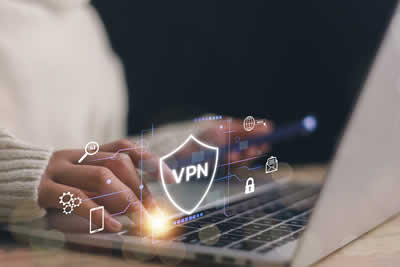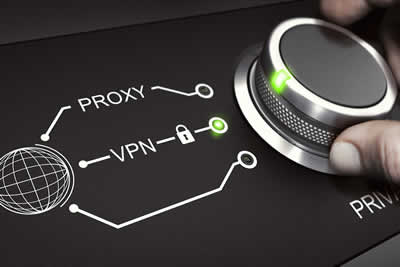Advances in technology can be great for business but unfortunately, in today’s digital landscape, these are usually closely followed by data breaches, cyberattacks and illegal online tracking. When standard online security isn’t quite up to the job, a great many internet users are looking to supersize their security by using proxies. While this can be helpful, it’s also quite a complex concept and if you don’t understand the technology and its legitimate uses, it's easy to fall foul of the law or gain a bad reputation.

In this article, we’re providing a comprehensive look at proxies and legitimate use cases along with some important best practices for both business and personal use.
What is a Proxy?
A proxy is a service which provides a middle man between a user’s device and the world wide web. The purpose of this is to essentially hide the address of your device - for example; you want to access a website while masking your identity. Your request is sent to the proxy server which then forwards it to your chosen website. This way, the receiving website sees only the proxy server’s IP address and not yours, protecting your device from potential harm.
There are a few different types of proxies and these include:
- HTTP Proxies: These proxies are usually used for surfing the internet and can be useful in getting around geographic restrictions and for filtering content through HTTP requests and responses.
- SOCKS Proxies: Nothing to do with the things you put on your feet, these operate on a lower level and are ideal for handling virtually any type of internet traffic including gaming, torrenting and video streaming.
- Residential Proxies: This type of server runs internet traffic through real residential IP addresses which is a way of stopping websites from recognizing them as proxies. These will often be used for activities such as web scraping where the user wants to avoid being flagged as suspicious. Proxy servers like these will usually be used in cases where anonymity is essential, often within data collection.
- VPN (Virtual Private Network): A close cousin to some of the above, VPNs create encrypted tunnels between devices and servers to provide privacy and security.

Legitimate Uses For Proxies
As we know, not every internet user is a model citizen and some do unfortunately use these servers for evil rather than good, but in this section, we’re looking at some above board uses instead.
1. When privacy and anonymity are important
Every time we go online, we become visible to others which means that advertisers, websites and, sadly, hackers might be able to benefit from snooping at our IP addresses. Perfectly legit, a server like SOCKS can be used to make it trickier if not impossible for individuals or businesses to follow you around the web to see what you’re up to. These act as a kind of shield between your phone or laptop and those who might want to harass you with ads, profile you or commit cybercrime against you. These can also be used to encrypt your communications such as emails or messages to add a further level of security and privacy to your online life.
2. Providing a workaround for restrictions
Geo-restrictions can be incredibly frustrating when searching for or trying to access a website. This is when websites are only available for use within a certain territory or country. An example of this might be a video streaming platform which is only available to people in the USA. If you’re in the UK and are denied access, this can be very annoying... A VPN can help here by masking your location and, in fact, make it look as though you are accessing the site from a permitted location - letting you get onto the gaming site without having to jump on a plane.
Similarly, these can also be used in instances where certain types of content are banned or censored - such as particular films and TV programs in countries which have strict laws regarding entertainment. A final use is to bypass government placed firewalls in countries such as China and Iran. While all this may sound a bit suspect, it is (mostly) legitimate.
3. Making the internet a safer place to play
If you’re out and about a lot, there’s a good chance that you use public WiFi - whether that’s checking your emails at the train station or accessing a weather app in your local pub.

While free WiFi might seem like a pretty good deal, it can be a playground for cybercriminals and other malicious folk. Using a proxy server is a great way of placing a layer of security between your device and the baddies; particularly when accessing mobile banking apps and shopping sites which hold your financial info such as your debit card details or Paypal account. It’s good practice to use these every time you log onto public WiFi as they can protect you from phishing and other cyber-nasties that could cost you dearly.
4. The business end of proxies
We’ve talked about personal activities like gaming and video streaming but these internet masking tools can also be a great solution for the business world. Many companies are in the business of collating massive amounts of data from the internet for use in things like market research, price comparisons and competitor studies. This is often referred to as scraping and is discouraged by search engines which will look for such activity and stop it through the use of anti-scraping measures.
To avoid this, businesses will sometimes use SOCKS or a VPN when engaging in these types of activities. As their identity is hidden, they are free to do research and conduct surveys to improve their own performance - without risking being caught out by anti-scraping tech or muddying results.
5. Keeping your personal info private
IMAGE 5
It’s a sad fact that hackers are becoming ever more sophisticated in their attempts to get hold of your personal information. And it hardly needs saying that if they succeed, they may be able to empty your bank account or even steal your identity.

This obviously means that you need to do everything in your power to keep them out, and you can do this by hiding your IP address. This allows you to prevent hackers from tracking your internet activity and / or directly attacking your phone or laptop. This can also be useful in blocking some malicious web traffic and plugging any vulnerability gaps on your device - particularly when using public WiFi - which is routinely targeted by cybercriminals.
Proxy Best Practices For Personal And Business Use
There’s no doubt that these servers have a number of great benefits but it's important to familiarize yourself with the rules of responsible use to avoid doing anything that might be less than legal or ethical. The following are some good best practices to keep you inline while online:
1. Don’t break the law
It should go without saying (but we’re going to say it anyway) that you shouldn’t use this technology to commit criminal acts such as online fraud or identity theft. This might be done by, for example, creating a fake account or trying to influence online voting systems - both of which smash legal and ethical rules.
Above all, don’t make the mistake of thinking that what you do online is free of consequences! You may feel comfortable in your own space, but if you’re caught breaking laws and regulations, you risk hefty fines and even legal action. Bottom line - if it seems iffy, don’t do it!

If you'd like to learn more about what we provide, why not take a look at how we can help?
Boost your skills with our market-leading online courses at super-low prices.
2. Choose your providers wisely
As with anything else, proxy providers can vary widely, swinging from high quality and super secure to seriously dodgy. Before choosing a provider, always do your research and look at reviews - some things to look out for are:
- Transparent terms of service and use
- High quality customer support
- Evidence of adherence to industry, privacy and security standards
If something doesn’t seem right, move on - and keep going until you find the right fit for your needs.
3. Stay ethical!
We’ve already talked about staying legal when using your shiny new server but ethics deserve a mention too. Security measures are there for a reason so you should never try to get around these. Similarly, try to respect the terms of service when web scraping as many sites have their own anti-scraping systems which might mean you’ll find yourself on the wrong side of the law. When online, always try to make sure that your activities are not breaking the law or, just as importantly, harming an individual or company.

4. Monitor, analyze and update
We’ve already had a word about data-scraping but it’s important to reiterate this. If you’re flagged for doing this you could be banned, fined or even taken to court and so it's essential that you stick to best practices and continually manage your own usage to avoid getting into trouble. A good tip here is to rotate your proxies which will put you at less risk of being detected and penalized.
5. Don’t get complacent about cybersecurity
Cybersecurity is by no means a one-time only deal but, instead, should be continuously monitored and updated, including your proxies (which should support HTTPS for superior encryption and protection from snooping). Get into the habit of checking all of your security measures including firewalls, antivirus software and encryption tools on a regular basis to avoid falling into the hands of cybercriminals.
Conclusion
Like all advances in technology, proxy servers are a great way of forcing others to mind their own business and for maintaining the security of your device - as long as they are used properly. They can help you stay anonymous and secure; however, it's vital that you take the time to understand the rules, regulations and best practices to avoid inadvertently crossing legal and ethical lines. By choosing a reputable provider and adhering to best practices, you can surf the web to your heart’s content - safely, securely and privately.






























